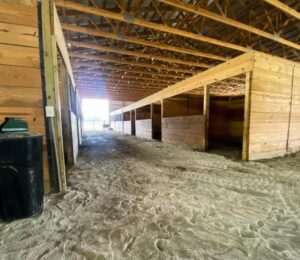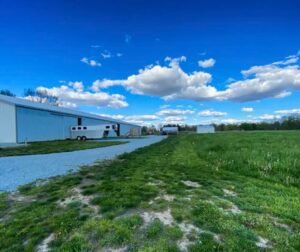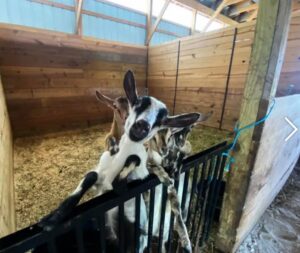Equines are Dr. Skillman’s primary passion, but she also offers small ruminant services as well. Herd health, vaccinations, castrations, and more services are available to owners of goats, sheep, llamas, and alpacas.
We recommend an annual wellness exam to coincide with annual booster vaccinations. Each horse should be vaccinated for eastern and western encephalitis, Tetanus, Rabies, and West Nile virus annually. Since most of these diseases are spread via mosquito transmission we highly encourage you to schedule this appointment before the summer months of each year. Depending on your horse’s age, job, and travel plans will determine what other vaccines are recommended for your horse. Some horses may need to be boostered for influenza and rhinopneumonitis every six months. We do not believe in a “one size fits all” health plan for your equine. We enjoy customizing a health plan that satisfies both owner and veterinarian. Other services such as a dental, fecal, or sheath cleaning can be added on to your annual equine wellness appointment. Please keep in mind that to stay in current standing for any emergency services it is up to the owner to have their horse seen annually for a non-emergency service.
Dr. Skillman provides before/after hours care for *current clients on Monday-Friday, and an emergency equine co-operative with several local clinics for weekend and holiday emergency coverage. This ensures that you, as a horse owner, always have an on-call veterinarian on weekends and holidays..
*A current client is one that has been seen by Dr. Skillman in the last 12 months for non-emergency services. Since Dr. Skillman is the only veterinarian in the practice there will be times that she can not be in two places at one time. We always recommend having a trailer as a back up plan if we can not service you in the amount of time your animal needs to be seen. It is up to the owner to remain in current standing so that we may help provide you with emergency care if needed. Our emergency policy is necessary to help provide the best and most accessible care for our valuable clients.

We understand not everyone has access to a trailer. For this reason, we are providing you with these contacts that may be of assistance to you.
Rachel Lehr (Westfield, IN) 317-752-3729
Katie Heim (Zionsville, IN) 317-258-1615
Katrina and Al Napier (Martinsville/Mooresville) 317-797-9639
Kayla Maxwell (Greenwood) 813-362-2383
Kay Delullo (Atlanta) 317-258-4663
Cheyenne Cornett (Marion/Fairmount) Indiana 765-618-1010
Don Bode (Strawtown) 317-385-9199
Yes! We encourage it. Our Haul-In Vet Clinic is located at 4741 E 400 S, Middletown, IN 47356 on a beautiful 48 Acre farm. You can schedule an in-clinic appointment and bring your animals here to us. Give us a call to schedule (317) 829-6530 or complete our online appointment request
Skillman Veterinary Services regular clinic hours are Monday-Friday from 8 am – 5pm. Our emergency hours are available Monday – Thursday from 7 am – 8am, and from 5pm until 10 pm. Weekend emergency hours (with on-call veterinarian) begin Friday at 5pm until Monday at 7am.. View Emergency Hours & Policies




In the state of Indiana only veterinarians are legally able to perform dentistry including but not limited to floating teeth using power tools. If sedation is needed to perform floating only a veterinarian can legally prescribe medication for your horse. In addition to floating teeth your veterinarian will perform an examination, help make a diagnosis, and treat any underlying conditions that may or may not be related to dentistry. Anyone can go to a “class” or an 8 week program and become an equine “dentist”. Veterinarians attend four years of school post-undergraduate studies specializing in practicing medicine and are required to attend continuing education to stay up to date and to help sharpen their skills. Lastly, many equine dentists do not carry liability insurance like your veterinarian does meaning your insurance or assets could be held liable if complications occur as a result of any procedures performed.
Depending on your horse’s job and health status will determine how often your horse’s feet should be trimmed. Every 6-8 weeks is a good guideline for most horses in Indiana. A longer interval between trimmings or showings can lead to imbalance or overgrown toes which will cause extra stress on the hoof wall as well as the tendons and joints. A farrier appointment is a great way to have a second set of eyes on someone who knows your horse and gain some great information from an experienced horse person. If you are in need of a farrier recommendation we would be glad to provide some.
Previously accepted practices such as rotational deworming schedules is outdated and not the standard of care for horses today. Research has proven that targeted deworming protocols for individual farms is effective and helps avoid resistance to the few dewormers we have access to. The best method of determining a targeted deworming protocol for your horse or farm is by routine fecal egg counts and fecal egg count reduction tests. Please contact us so that we can help customize a targeted deworming protocol for your horse or farm.
Any sudden fluctuation in your horse’s weight whether it be an increase or a decrease is worth a conversation with a veterinarian. An increase in weight could be a sign of Equine Metabolic Syndrome (EMS) or PPID (Pituitary Pars Intermedia Dysfunction) and could mean your horse is more in danger of developing a sometimes fatal disease such as laminitis. A decrease in weight could be a sign your horse needs its teeth examined or have some bloodwork done to be screened for kidney disease or cancer. A veterinarian can also weigh in on an appropriate nutrition plan regarding an increase or decrease in your horse’s weight.
Some of the procedures we provide may require some degree of sedation for your horse. Seeing a horse sedated for the first time may be overwhelming, scary or emotional. Please let us know if you have any concerns or if your horse has had any complications from sedation before. The most common form of sedation we use is an intravenous medication which will become effective in less than a minute. Most of the time the sedation for your horse will last only an hour and your horse will remain standing the entire time. Your horse may hang its head low, twitch, or stumble. Please allow us and our care team to take over in these situations for your safety and your horse.
A lot of states now accepted an extended equine certificate of vet inspection or an EECVI when you travel across state lines with your horse. This is a 6 month document that your veterinarian signs off on once saying your horse is healthy at the time the Coggins was pulled. An owner can go into globalvetlink.com and then request an unlimited amount of CVI’s for crossing state lines with their horse within six months of having their Coggins pulled. The following states are participating states in this program: AL, AR, AZ, CA, FL, GA, ID, IN, KS, KY, LA, MD, MN, MO, MS, MT, NC, ND, NM, NY, OK, OR, RI, SC, SD, TN, TX, UT, VA, VT*, WA, WV and WY. (*Vermont only participates May 1 – October 31). Please reach out to us today if you would like to schedule an exam so that we may offer you an EECVI.
Each visit will always have one farm call charge and examination charge per animal seen. The farm call fee accounts for the cost of vehicle and gas, time spent to and from location, tech charge, and professional fees such as insurance. The farm call charge generally ranges between $65-$90 but will increase by miles depending on your location. An examination charge is $50 and accounts for the use of an experienced veterinarian. Any additional services, diagnostics, and medications will be added on per item. Please contact us via phone, email or text regarding any pricing questions you may have. Any services provided after hours will have an added emergency fee.
We accept Cash, Check, Credit Cards: Visa, Mastercard, American Express, and Discover.
There is no discount for cash and no surcharge for credit cards. Payment is due at time of provided services.
*We do not accept Zelle, PayPal, Cash App, Venmo, or Care Credit.
